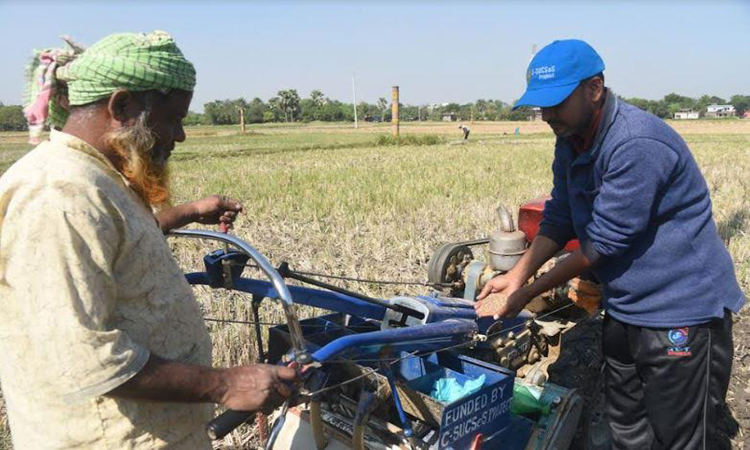News Flash

RAJSHAHI, Sept 30, 2025 (BSS) - Bed planting technology is being promoted in the region, including its vast Barind tract, to make farming more efficient and climate-resilient.
It improves soil and water management, leads to better fertilizer and seed utilization, and helps protect crops from pests and lodging. This ultimately increases yields, benefiting small farmers.
Talking to BSS today, Principal Scientific Officer at Soil Resource Development Institute Dr Nurul Islam said, “Bed-planting technology reduce cultivation time and cost significantly compared to the conventional methods.”
He said a bed planter attached to a two-wheel tractor performs multiple tasks in a single pass, including soil tillage, bed formation, fertilizer application, and seed sowing.
This method creates raised beds, which improves water distribution and ventilation, preventing waterlogging. Farmers can achieve better results with fertilizer and seed use, saving up to 30 to 40 percent on these inputs.
By reducing the number of tillage passes, bed planting significantly cuts down on fuel and labor costs. The bed structure acts as a natural barrier against pests and weeds.
Dr Nurul said the technology helps protect crops from damage caused by excessive water, wind, and vertebrate pests, making agriculture more resilient to climate variability.
The systematic placement of fertilizer alongside seeds and better soil conditions lead to higher crop yields. It alleviates the shortage of labor, a significant challenge for many farmers.
Shimul Islam, a farmer of Godagari in the district, said the bed-planting technology has already started transforming conventional agriculture into climate-resilient in the-region.
He said the newly introduced technology-based method is making the cultivation system easy and less expensive promoting smart farming in the country.
Since seeding and fertilizing are completed in one round through the machine, the fertilizer is placed closely and systematically beside the seeds, resulting in good crop yields, the expert added.
Explaining the technology-based cultivation system, Dr Nurul said wind and water management work efficiently in the system which help boost crop production.
Shimul mentioned that the bed planting technology contributes to the timely and efficient growth of crops with fewer rounds of soil work, reducing the vulnerability to natural calamities.
The bed formation also acts as a barrier, protecting crops from vertebrate pests and weeds.
Senior Scientific Officer of Bangladesh Agricultural Research Institute (BARI) Dr Shakhawat Hossain said a groundbreaking agricultural revolution is underway in the region through the innovative bed planting technology.
It is a smart method as it does not require any separate equipment meaning that a single round of bed planting is sufficient, curtailing the need for separate seeding and fertilizing.
In this method, the machine featuring two types of furrow opener at the rear-one for seeds and the other for fertilizer- is maintaining specific distances for optimal growth.
Dr Hossain said they have generated local service providers by giving bed planters for bed planting operations with the project interventions.
They are also enhancing the skills, marketing expertise and behavioural changes of the local service providers.
"Some of them have gained expertise even from outside the country. As a result, the service initiatives have positively inspired the local entrepreneurs," the official said.
This year, they have given technological support to 200 marginalized farmers, including 60 females as demand for the service providers are gradually increasing in the region, he added.
In order to manage the workload efficiently, the local service providers are seen distributing some of the workloads to their assistant bed planters.
The technology not only ensures a more sustainable approach to agriculture but also lights up the faces of those resilient farmers who persevere against the odds.
Its success has sparked a growing interest among the local community, highlighting its potential as a solution to longstanding agricultural challenges.
With this breakthrough, farmers in this region are not only adapting to climate change but also enhancing crop yield and sustainability, Dr Hossain said.